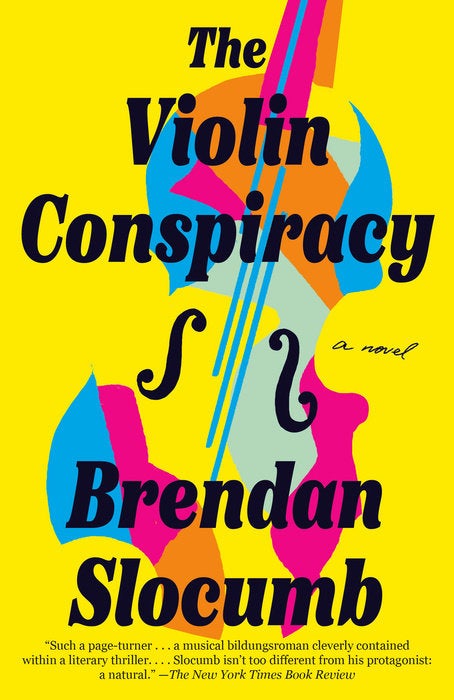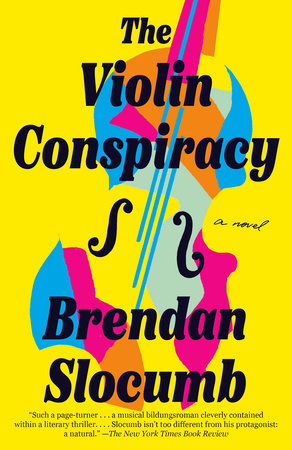

Debut author Brendan Slocumb is about to become a household name. His very first novel, The Violin Conspiracy, is a riveting page-turner about Ray McMillian, a Black classical musician on a desperate quest to recover his lost violin on the eve of the most prestigious musical competition in the world. Brendan himself is a professional violinist who faced unchecked discrimination in the world of classical music, and he draws from a lot of his own experiences to tell Ray’s story with incredible empathy and insight.
As Booklist recently raved, “[A] galvanizing blend of thriller, coming-of-age drama, and probing portrait of racism. . . . This flawless debut will do for classical music what The Queen’s Gambit did for chess.” We couldn’t have put it better ourselves.
Read on for a Q&A with the author and learn more about what drove him to write this remarkable book. And don’t forget to check out our reading guide and the playlist that the author put together to enrich your reading experience–you’ll be hard-pressed to find a better book club selection this year than The Violin Conspiracy!
RGC: The Violin Conspiracy is a deeply personal work of fiction. How did you draw from your own life to inspire the story?
Brendan Slocumb: Several of the experiences in the story come from my own life, like my violin being stolen my senior year of high school, the Baton Rouge encounter, and the college performances. I’ve experienced many incidents of discrimination, which I reworked into the novel. One example is the wedding scene, where the protagonist, Ray, isn’t allowed to play at the ceremony because of the color of his skin. That actually happened to me. My beta readers kept asking me to cut this scene or trim it because they couldn’t believe it could happen–but it did. So, it was easy for me to use that event as a framing device to show such blatant racism.
The trick, though, was to figure out how to use my experience to tell Ray’s story. So, in the wedding scene, if Ray hadn’t absolutely loved the actual process of performing, the kind of racism he experienced that day might have been enough to make him quit altogether. Or it could have changed him into something else–someone jaded, not open to new experiences; someone bitter and angry. But Ray got a taste of what music could do, and it really showed him how much it meant to him. That scene also allowed me to deepen Ray’s love of music and performing.
RGC: Ray McMillian is such a memorable, empathetic protagonist. How did you approach writing his character, and what do you hope readers take away from his journey?
BS: I took pieces of myself, former students, friends, and family members to create Ray. The most important aspects I wanted to convey were his perseverance and staying true to himself. Always being that nice boy his grandma loved so much regardless of what was being thrown at him.
That said, Ray had to learn to stand up for himself. He learned to stand tall. Music gave him the confidence–as did his mentors, Grandma Nora and Janice. He learned and grew from all his experiences. I just think it would have been impossible to invest in him emotionally as a character if he didn’t have self-respect. I wouldn’t have wanted to write about a guy who was a pushover, who would cave to social pressures or crumble when people who didn’t look like him said stupid things to him. Often, people miss the one opportunity they have to stand up for themselves and find courage. For Ray, music and the violin gave him that opportunity. I’m glad he took it.
RGC: The world of classical music is, of course, central to the novel, but also in your own life. What do you hope to accomplish with your depiction?
BS: I’ve been walking around with stories to tell for most of my life. I know, being in the classical music world, that there are a lot of people just like me, with similar stories, and we’ve never had the opportunity to tell them before. Nobody really cared how hard it was to play the violin or felt sorry for me if I couldn’t take private lessons. Which is fine: I don’t need people to feel sorry for me. But they didn’t seem to want to hear what I faced, as a Black man. My perspective was vastly different from what they were used to, and by “different” it seemed that it also meant that my perspective was wrong. When I told people about things that happened in my life, people would say, “No you’re exaggerating; no that doesn’t happen; you are imagining it.” Finally, the tragic events of 2020 made it seem like this was a moment when I could tell my stories, and that people would actually listen to me, acknowledge my experiences, and not deny that my perspective was as valid as theirs.
In this novel, I wanted to let people know that classical music–like all music–can be appreciated by everyone. It’s a vehicle of expression that can literally take you to unknown, extraordinary, wonderful places–regardless of your race, social status, gender, and so forth. But there’s so much work to be done so that people of all races and backgrounds can appreciate classical music.
RGC: Can you describe your typical writing routine? Do you have any particularly fun quirks or habits that help you in the creative process?
BS: Typically, I start on my living room couch. I sit down on the couch to eat breakfast, and I turn to writing right afterward. After I’ve exhausted all positions on the couch–my feet up on the couch, my feet over the couch, my feet on the coffee table, lying prone, etc.–I know it’s time for a change of scene, so I move to my office to finish up. My writing goal is 2,000 words a day, and I try to exceed that by taking several breaks in between by playing video games. I’m a big fan of Marvel’s Contest of Champions and have been with the same crew for five years (DB4E). We usually play five or six rounds in an hour, and then I go back to writing. I find that the break–doing something else that I like–refreshes me and allows me to have a new perspective when I return to writing. I also pretend I’m watching a movie when I write. If a character is coming in a door, I turn my head to the left, where the door is, and watch her go to wherever it is she’s going to sit. This helps orient me in space and helps move the plot forward.
RGC: What is the best writing advice you’ve ever received?
BS: Write what you know–and to be honest about it. Writing about something that you’ve experienced will have a ring of authenticity to it that can’t be faked. If you don’t believe it or believe in it, no one else will either.
RGC: Imagine you’re part of a book club discussing The Violin Conspiracy. What is a topic or question you would like to pose to the group?
BS: Did this book change you at all? Now that you’ve read it, do you have any new perspectives as a result of reading this story?

The Violin Conspiracy by Brendan Slocumb
GOOD MORNING AMERICA BOOK CLUB PICK!
Ray McMillian is a Black classical musician on the rise–undeterred by the pressure and prejudice of the classical music world–when a shocking theft sends him on a desperate quest to recover his great-great-grandfather’s heirloom violin on the eve of the most prestigious musical competition in the world.
“I loved The Violin Conspiracy for exactly the same reasons I loved The Queen’s Gambit: a surprising, beautifully rendered underdog hero I cared about deeply and a fascinating, cutthroat world I knew nothing about–in this case, classical music.” –Chris Bohjalian, #1 New York Times bestselling author of The Flight Attendant and Hour of the Witch
Growing up Black in rural North Carolina, Ray McMillian’s life is already mapped out. But Ray has a gift and a dream–he’s determined to become a world-class professional violinist, and nothing will stand in his way. Not his mother, who wants him to stop making such a racket; not the fact that he can’t afford a violin suitable to his talents; not even the racism inherent in the world of classical music.
When he discovers that his beat-up, family fiddle is actually a priceless Stradivarius, all his dreams suddenly seem within reach, and together, Ray and his violin take the world by storm. But on the eve of the renowned and cutthroat Tchaikovsky Competition–the Olympics of classical music–the violin is stolen, a ransom note for five million dollars left in its place. Without it, Ray feels like he’s lost a piece of himself. As the competition approaches, Ray must not only reclaim his precious violin, but prove to himself–and the world–that no matter the outcome, there has always been a truly great musician within him.